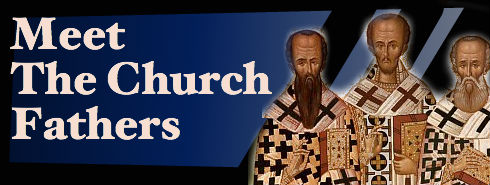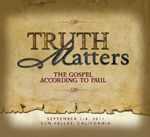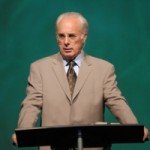The article I posted here by Nathan Busenitz on Saturday (September 24) has now been updated. It used to contain 20 quotes; now there are 30, and very importantly, now it includes the source references. Many thanks to Nathan for making this excellent article even better.
Yearly Archives: 2011
180 Movie

Deeply impacting!
Its become something of a vastly overused and worn out cliche to say that something is “life changing”, but if there ever was a movie made which could lay claim to such a term, surely this is it. ‘180’ is our wake up call.
May God bless and strengthen Ray Comfort and all involved in this amazing project. Lets spread the word far and wide about this powerful movie and get it into the hands of as many people as we can.
ENDORSEMENTS:
“I give my unflinching, joyful, trembling Yes to ‘180’. Unflinching, because it’s right. Joyful, because it’s good. Trembling, because this our defeated enemy is still vicious.” Dr. John Piper – Bethlehem Baptist Church
“‘180’ is 33 minutes of video adrenaline, shock, and hope.” Kirk Cameron – Actor and TV Co-host
“Riveting!” Joni Eareckson Tada – Joni & Friends
“Mind-blowing and unforgettable!” Randy Alcorn – Eternal Perspective Ministries
“After viewing 180 last night one couple wanted to invest in a couple of thousand copies, and give them away in the surrounding neighborhoods near our church.” Trisha Ramos (TX)
“As one who was scheduled to be aborted, this astounding video struck me at my core that this is needed more now than ever. It is more than powerful…it is a vehicle of God’s voice to this generation, and must be seen!” Ron DiCianni
Here’s the 180 movie:
For more information or to order “180” on DVD, please go to this link.
Here’s one person’s outreach. He says, “Giving away 180 is easy, all you need are some DVDs and a servant’s heart.”
Among whom are Hymenaeus and Alexander
 Pastor John, but now have shipwrecked it, we must conclude that one can lose true faith in Christ.
Pastor John, but now have shipwrecked it, we must conclude that one can lose true faith in Christ.
How would you respond to this claim? Is there more that can be said about these two men, besides, “Since other Scriptures teach perseverance, then we must assume that the faith of Hymenaeus and Alexander must have been a mere profession”?
I think the last sentence in your question does indeed go a long way towards answering your own question, though I believe much more could and should be said.
The 1 Timothy 1:18-20 passage reads:
This charge I entrust to you, Timothy, my child, in accordance with the prophecies previously made about you, that by them you may wage the good warfare, holding faith and a good conscience. By rejecting this, some have made shipwreck of their faith, among whom are Hymenaeus and Alexander, whom I have handed over to Satan that they may learn not to blaspheme.
To fully exegete the passage would take far more space than a short blog article would allow for, but I would like to draw out a number of points from the biblical text.
Continue reading
The Gospel According to the Church Fathers
by Nathan Busenitz (from a blogpost California.

After the apostles died, was the gospel hopelessly lost until the Reformation?
That certainly seems to be a common assumption in some Protestant circles today. Thankfully, it is a false assumption.
I’m not entirely sure where that misconception started. But one thing I do know: it did not come from the Protestant Reformers.
The Reformers themselves (including Luther, Zwingli, Calvin, and others) were convinced that their position was not only biblical, but also historical. In other words, they contended that both the apostles and the church fathers would have agreed with them on the heart of the gospel.
For example, the second-generation Lutheran reformer, Martin Chemnitz (1522-1586), wrote a treatise on justification in which he defended the Protestant position by extensively using the church fathers. And John Calvin (1509-1564), in his Institutes, similarly claimed that he could easily debunk his Roman Catholic opponents using nothing but patristic sources. Here’s what he wrote:
If the contest were to be determined by patristic authority, the tide of victory — to put it very modestly —would turn to our side. Now, these fathers have written many wise and excellent things. . . . [Yet] the good things that these fathers have written they [the Roman Catholics] either do not notice, or misrepresent or pervert. . . . But we do not despise them [the church fathers]; in fact, if it were to our present purpose, I could with no trouble at all prove that the greater part of what we are saying today meets their approval.
Source: John Calvin, “Prefatory Address to King Francis I of France,” The Institutes of the Christian Religion, Section 4.
How could the Reformers be so confident that their understanding of the gospel was consistent with the teachings of the ancient church? Or perhaps more to the point: What did the early church fathers have to say about the gospel of grace?
Here is an admittedly brief collection of 30 patristic quotes, centering on the reality that justification is by grace alone through faith alone. Many more could be provided. But I think you’ll be encouraged by this survey look at the gospel according to the church fathers.
(Even if you don’t read every quote, just take a moment to consider the fact that, long before Luther, the leaders of the ancient church were clearly proclaiming the gospel of grace through faith in Christ.)
1. Clement of Rome (30-100): “And we, too, being called by His will in Christ Jesus, are not justified by ourselves, nor by our own wisdom, or understanding, or godliness, or works which we have wrought in holiness of heart; but by that faith through which, from the beginning, Almighty God has justified all men; to whom be glory forever and ever. Amen.”
Source: Clement, First Epistle to the Corinthians, 32.4.
Continue reading
Reality Hits You Hard, Bro!
Friday Round Up
 (1) Back in 2005, Dr. Wayne Grudem taught an outstanding message at an ETS Conference on the theme “Are Only Some Words of Scripture Breathed Out By God?” I am pleased to see that it is now in a written format, both in a condensed form I was directed to a very helpful and insightful article by Carolyn McCulley called “Why pray for a husband?” Though obviously written for women, the principles outlined have application for men also.
(1) Back in 2005, Dr. Wayne Grudem taught an outstanding message at an ETS Conference on the theme “Are Only Some Words of Scripture Breathed Out By God?” I am pleased to see that it is now in a written format, both in a condensed form I was directed to a very helpful and insightful article by Carolyn McCulley called “Why pray for a husband?” Though obviously written for women, the principles outlined have application for men also.
(3) I appreciated this quote from John Piper:
“I am a lover of the Reformed faith — the legacy of the protestant Reformation expressed broadly in the writings of John Calvin and John Owen and Charles Spurgeon and Jonathan Edwards, and contemporaries like R. C. Sproul and J. I. Packer and John Frame.
I speak of love for this legacy the way I speak of loving a cherished photo of my wife. I say, “I love that picture.” You won’t surprise me if you point out, “But that’s not your wife, that’s a picture.” Yes. Yes. I know it’s only a picture. I don’t love the picture instead of her, I love the picture because of her. She is precious in herself.
The picture is precious not in itself, but because it reveals her. That’s the way theology is precious. God is valuable in himself. The theology is not valuable in itself. It is valuable as a picture. That’s what I mean when I say, “I love reformed theology.” It’s the best composite, Bible-distilled picture of God that I have.” (Bloodlines, 129-130).
 (4) I am thinking of cancelling the giveaway I mentioned last week due to an apparent lack of interest.
(4) I am thinking of cancelling the giveaway I mentioned last week due to an apparent lack of interest.
(5) On assurance and the ongoing battle with indwelling sin:
“If you feel that you are empty, if you feel you are nothing, if you feel you are poor and wretched and blind, if you hate your inclination to sin and have any suspicion of a feeling of self-loathing and hatred, you can take it from me that you have eternal life, for no one ever experiences such things until the life of God comes into his or her soul.” – Martyn Lloyd-Jones
(6) Please continue to pray for a very good friend of mine, Pastor Graeme Adams, in Dundee, Scotland, who was recently rushed to hospital because of chest pains. The doctors have so far eliminated the idea of him having had a heart attack, but so far they have not determined the cause, though it could well be stress related. He is back home now but is very weak and tired. Please pray for Pastor Graeme and his wife Rhonda, their two sons, and for the precious Church he pastors.
 (7) Once again, Ligonier has some excellent deals today in this week’s $5 Friday sale. especially for audio and video downloads. The children’s book and the “Believing God” book are also excellent. The online sale started at 8 a.m. EST and goes on for 24 hours or until items are sold out. Check out the $5 sale items here
(7) Once again, Ligonier has some excellent deals today in this week’s $5 Friday sale. especially for audio and video downloads. The children’s book and the “Believing God” book are also excellent. The online sale started at 8 a.m. EST and goes on for 24 hours or until items are sold out. Check out the $5 sale items here.
The Kingdom of God v. The Kingdom of Heaven
 Pastor John, what is the difference between the kingdom of God and the kingdom of heaven?
Pastor John, what is the difference between the kingdom of God and the kingdom of heaven?
The short and simple answer is “nothing at all.”
To answer this question properly, I need to provide some background. Matthew, being a Jew and writing to a primarily Jewish audience (with the purpose of showing how Jesus is the long awaited Messiah) was very reticent to use the name of God. That is because of its hallowed name in Hebrew society and religion.
This dates back all the way to the time of Moses and to the sacred name of God revealed in the Pentateuch. Most scholars believe that this name probably sounded like “Yahweh” but this is merely the best educated guess.
Why is this only a guess?
Well, being very mindful of the blasphemy of taking the sacred name of God and using it in vain (one of the Ten Commandments) when writing the name, they removed the vowels. They did this in hope that this might cause people to not speak the sacred name at all (rather than speak it in a vain way). God was so holy and His name was to be revered as no other name and so to treat it lightly would provoke God’s anger and wrath towards them as a people. Therefore in the original Hebrew of the Old Testament, all we are left with, when transliterated into English is “YHWH.”
Many centuries on, we have to only guess what those vowels might be because there is nothing to show us exactly what they were, and as I say, “Yahweh” is the best estimate of a guess by scholars.
Some say that the way this would have sounded would be “Jehovah,” but more careful scholarship dismisses that claim, and the vast majority would say the original sound of the name would be as close as possible to “Yahweh.” Most Jewish scholars are naturally reluctant to even look into this debate, because of what the issue means historically in Jewish society and how easy it would be to blaspheme God’s holy (set apart) name.
For us as Gentles, growing up in a culture where the name of God is not hallowed in the same way, this appears to be an over reaction on the part of the Jewish people to treat God’s name in this way. However, to the Jews, this made perfect sense and someone writing to Jews would need to take this into account if he wished to be read at all. This Jewish reluctance to use the name of God is seen even in today’s society in Israel where, for example, the Jerusalem Post (a secular newspaper) will spell the divine name as G-D, (putting in a dash rather than the “O” vowel), so as not to offend their orthodox Jewish readers (who can be very vocal).
I find it very interesting to note that in what we call “the Lord’s Prayer” Jesus instructed His disciples to make the very first petition a request that God’s name would be given its due reverence. When we say “Hallowed be Thy Name” we are actually asking God that His Name would be revered and set apart as holy. It is as if we are saying “May Your Name be hallowed.” Yet how wonderful it is that before we come to this request, we can, as His children, speak to Him as “Father.” Jesus, in teaching His people to pray, establishes both the transcendent majesty of God as well as the deep personal intimacy we have as His children. How wonderful this is.
I say all this to point out that while other gospel writers use the phrase “the Kingdom of God” when they are writing primarily to non Jews, Matthew prefers to use “the kingdom of heaven.” Matthew will use the word “God” of course, but it was rare for him to do so, and where there was the chance to use a different term, he did so.
This becomes immediately apparent when we compare Matthew and the other synoptic Gospel writers (Mark and Luke) when they are recalling either the exact same words of Jesus. Quoting the KJV, here are some examples:
Matthew 4:17 From that time on Jesus began to preach, “Repent, for the kingdom of heaven is near.”
Mark 1:14-15 Now after that John was put in prison, Jesus came into Galilee, preaching the gospel of the kingdom of God, {15} And saying, The time is fulfilled, and the kingdom of God is at hand: repent ye, and believe the gospel.
Matthew 5:3 “Blessed are the poor in spirit, for theirs is the kingdom of heaven.
Luke 6:20 And he lifted up his eyes on his disciples, and said, Blessed be ye poor: for yours is the kingdom of God.
Matthew 8:11 I say to you that many will come from the east and the west, and will take their places at the feast with Abraham, Isaac and Jacob in the kingdom of heaven.
Luke 13:28-29 There shall be weeping and gnashing of teeth, when ye shall see Abraham, and Isaac, and Jacob, and all the prophets, in the kingdom of God, and you yourselves thrust out. {29} And they shall come from the east, and from the west, and from the north, and from the south, and shall sit down in the kingdom of God.
Continue reading
The Gospel According to Paul
 The kind folks at Grace To You have made the recent “Truth Matters 2011 Conference” available for free listening and download at their site. I watched the conference through their online live streaming of the event earlier this month, and now the teaching is being made available to a wider audience who can listen in at their own convenience.
The kind folks at Grace To You have made the recent “Truth Matters 2011 Conference” available for free listening and download at their site. I watched the conference through their online live streaming of the event earlier this month, and now the teaching is being made available to a wider audience who can listen in at their own convenience.
The series of messages by Dr. John Macarthur were particularly outstanding. They enriched my soul.
This teaching will form the basis of an up-coming book by Dr. Macarthur, the final installment in his trilogy on the Gospel. The first was “The Gospel According to Jesus”; the second, “The Gospel According to the Apostles”; and this third one will be “The Gospel According to Paul.”
 Here are the session titles by Dr. Macarthur:
Here are the session titles by Dr. Macarthur:
(1) The Glorious Gospel
(2) The Gospel Satisfies the Sinner’s Need
(3) The Gospel Satisfies God’s Demands
(4) The Reconciling Gospel
(5) An Introduction to the Sovereign Gospel
(6) An Explanation of the Sovereign Gospel
(7) The Humbling Gospel
Then a final session:
(8) Practical Concerns in the Local Church: An Interview with John MacArthur
Here’s the link to either hear, download or purchase the Conference messages. Having heard each session one time through, I now aim to go through them again, this time taking extensive notes.
Giving Clothing a Mission
 I am pleased to announce today that this blog is now partnering with through the wonders of technology, the missionalwear site will recognize that you got to that site because my banner led you there and (wonder of wonders) a small percentage of the sale comes back to me by way of commission.
I am pleased to announce today that this blog is now partnering with through the wonders of technology, the missionalwear site will recognize that you got to that site because my banner led you there and (wonder of wonders) a small percentage of the sale comes back to me by way of commission.
This means of course that you would be getting some great quality clothing (which are often excellent conversation starters with both Christians and non-Christians), as well as supporting my family too. You could also annoy a whole bunch of Arminians every day when you wear the clothes… but maybe I should not say that! 🙂
Here’s the link. Enjoy!
Meditations on God’s love for us
 Deuteronomy 7:6 “For you are a people holy to the LORD your God. The LORD your God has chosen you to be a people for his treasured possession, out of all the peoples who are on the face of the earth. 7 It was not because you were more in number than any other people that the LORD set his love on you and chose you, for you were the fewest of all peoples, 8 but it is because the LORD loves you and is keeping the oath that he swore to your fathers, that the LORD has brought you out with a mighty hand and redeemed you from the house of slavery, from the hand of Pharaoh king of Egypt.
Deuteronomy 7:6 “For you are a people holy to the LORD your God. The LORD your God has chosen you to be a people for his treasured possession, out of all the peoples who are on the face of the earth. 7 It was not because you were more in number than any other people that the LORD set his love on you and chose you, for you were the fewest of all peoples, 8 but it is because the LORD loves you and is keeping the oath that he swore to your fathers, that the LORD has brought you out with a mighty hand and redeemed you from the house of slavery, from the hand of Pharaoh king of Egypt.
Jude:21 “keep yourselves in the love of God…”
“Can you imagine it, that God, who is greater than immensity, whose life is longer than time, that God the all-boundless One, should love you? That He should think of you, pity you, consider you, this is all very well—but that He should love you, that His heart should go out to you, that He should choose you, that He should have engraved you on the palms of His hands, that He should not rest in Heaven without you, that He should not think Heaven complete until He brings you there, that you should be the bride and Christ the Bridegroom, that there should be eternal love between Him and you—oh, as you think of it, lift up your hands with adoring wonder and say, ‘Your love to me was wonderful.’” – C. H. Spurgeon
And taken from “Morning and Evening,” by C.H. Spurgeon, revised and updated by Alistair Begg:
“I will rejoice in doing them good.” Jeremiah 32:41
How heartwarming to the believer is the delight that God takes in His saints! We cannot see any reason in ourselves why the Lord should take pleasure in us; we do not even take delight in ourselves, for we often have to groan, being burdened, conscious of our sinfulness and deploring our unfaithfulness. We are fearful that God’s people cannot take much encouragement from us, for they surely can see our many imperfections and our follies, and so be caused to lament our infirmities rather than admire our graces. But we love to dwell upon this transcendent truth, this glorious mystery: As the bridegroom rejoices over the bride, so the Lord rejoices over us.
We do not read anywhere that God delights in the cloud-capped mountains or the sparkling stars, but we do read that He delights in the habitable parts of the earth, and that His delights are with the sons of men. We do not even find it written that angels give His soul delight; nor does He say, concerning cherubim and seraphim, “Thou shalt be called Hephzibah . . . for the LORD delighted in thee.”1 But He does say all that to poor fallen creatures like ourselves-debased and depraved by sin, but saved, exalted, and glorified by His grace.
In what strong language He expresses His delight in His people! Who could have conceived of the Eternal One bursting into a song? Yet it is written, “He will rejoice over you with gladness; he will quiet you by his love; he will exult over you with loud singing.”2 As He looked upon the world He had made, He said, “It is very good”; but when He looked on those who are the purchase of Jesus’ blood, His own chosen ones, it seemed as if the great heart of the Infinite could restrain itself no longer but overflowed in divine exclamations of joy.
Should we not utter our grateful response to such a marvelous declaration of His love and sing, “I will rejoice in the LORD; I will take joy in the God of my salvation?”3
1Isaiah 62:4 KJV
2Zephaniah 3:17
3Habakkuk 3:18
